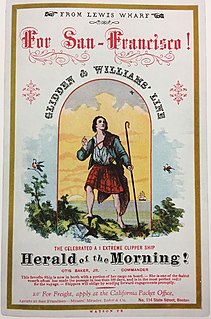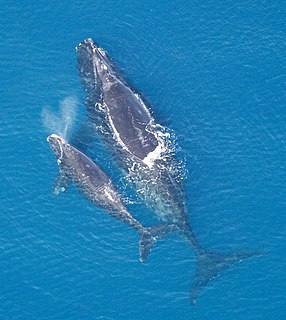 W
WDelta and Dawn, also known as the Delta whales, were two humpback whales, a mother and her calf, which entered San Francisco Bay in early May 2007. They swam up the Sacramento River approximately 90 nautical miles (170 km) upstream from the Golden Gate, about 20 miles (32 km) further inland than Humphrey the Whale had gone two decades earlier. Under the Endangered Species Act, California state officials were required to rescue the animals. Their journey was thought to be the longest freshwater incursion by humpback whales.
 W
WEssex was an American whaler from Nantucket, Massachusetts, which was launched in 1799. In 1820, while at sea in the southern Pacific Ocean under the command of Captain George Pollard Jr., she was attacked and sunk by a sperm whale. Stranded thousands of miles from the coast of South America with little food and water, the 20-man crew was forced to make for land in the ship's surviving whaleboats.
 W
WHerald of the Morning was one of the few clipper ships with a passage to San Francisco in less than 100 days.
 W
WKOBO is the skeleton of a 66-foot-long (20 m) juvenile blue whale on display at the New Bedford Whaling Museum in New Bedford, Massachusetts. The whale was accidentally struck and killed by a tanker and brought ashore in Rhode Island in March 1998. It was named by New Bedford sixth-grade student Katie Hallett and put on display in 2000. It shares the gallery with three other whale skeletons: a 37-foot (11 m) male humpback, a 49-foot (15 m) female North Atlantic right whale who was pregnant at the time of her death, and the right whale's fetus.
 W
WUSS Mitchell (DE-43) was an Evarts-class destroyer escort constructed for the United States Navy during World War II. She was sent off into the Pacific Ocean to protect convoys and other ships from Japanese submarines and fighter aircraft. She performed escort and anti-submarine operations in dangerous battle areas and sailed home proudly displaying nine battle stars, a very high number for a ship of her type.
 W
WMoby-Dick; or, The Whale is an 1851 novel by American writer Herman Melville. The book is the sailor Ishmael's narrative of the obsessive quest of Ahab, captain of the whaling ship Pequod, for revenge on Moby Dick, the giant white sperm whale that on the ship's previous voyage bit off Ahab's leg at the knee. A contribution to the literature of the American Renaissance, Moby-Dick was published to mixed reviews, was a commercial failure, and was out of print at the time of the author's death in 1891. Its reputation as a "Great American Novel" was established only in the 20th century, after the centennial of its author's birth. William Faulkner said he wished he had written the book himself, and D. H. Lawrence called it "one of the strangest and most wonderful books in the world" and "the greatest book of the sea ever written". Its opening sentence, "Call me Ishmael", is among world literature's most famous.
 W
WThe National Marine Fisheries Service (NMFS) and the National Oceanic and Atmospheric Administration (NOAA) established a rule in 2008 to implement vessel speed restrictions of 10 knots or less on ships 65 ft (20 m) or longer in various locations along the East Coast of the United States. The purpose of the regulations was to reduce the probability of deaths and injuries to endangered North Atlantic right whales due to collisions with ships. The rule was enacted December 9, 2008.